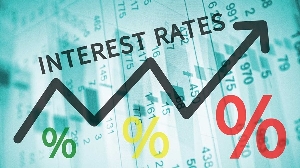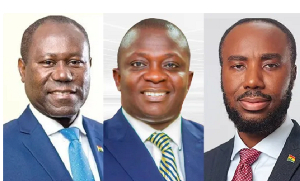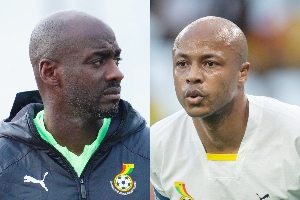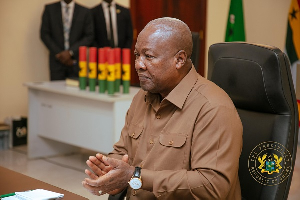The Bank of Ghana left its benchmark interest rate unchanged, amid improvements in domestic economic activity and some sluggishness in the pace of disinflation.
The monetary policy committee held the rate at 27%, Governor Ernest Addison said in an emailed statement Friday. Of the six economists polled by Bloomberg, three expected a hold and the others expected a cut.
“The horizon for inflation to get back within the target band of 6%-10% has slightly shifted forward to the fourth quarter of 2025 from the original forecast period of the third quarter 2025,” Addison said. “At the time of the last MPC meeting, average inflation forecast a year ahead which stood at 19% has increased slightly to 20.1% at this forecast round.”
Annual inflation quickened for a second straight month in October to 22.1%.
Addison also cited a strong US dollar and the possibility of higher energy and food prices arising from trade protectionism and geopolitical conflicts as among the factors that pose risks to the inflation outlook. The greenback has rallied since Donald Trump won the US presidential election on Nov. 5 as investors bet his trade and tax policies will buoy the currency.
These developments will have to be monitored closely for policy responses to ensure stability in the economy, Addison said.
In spite of the the threats posed by the external developments, the strengthening of the cedi in recent weeks “will augur well for future price developments,” he noted.
The cedi, which is down by more than 20% against the dollar this year, has recouped some of its losses in recent weeks after the central bank increased domestic dollar sales on the back of an improvement in reserves. Gross international reserves stood at $7.9 billion on November 22 compared with $7.8 billion in September, the central bank said.
The International Monetary Fund board will likely make its next disbursement of $360 million to the country next month after reaching a staff-level agreement on the third review in October, the Bank of Ghana said.
Ghana’s economy has shown signs of recovery since agreeing to a $3 billion IMF bailout package in May 2023 and a restructuring of almost all of its debt following a default. The economy grew 6.9% year-on-year in the second quarter.
The country’s eurobonds are among the best performing in emerging markets since they were reorganized in October, with notes maturing in 2029 gaining 0.1 cent to 88 cents on the dollar at 2:41 p.m. in London.
Business News of Saturday, 30 November 2024
Source: bloomberg.com













